| book_review_the_souls_of_china.pdf |
Only a person driven by serious pain and by a genuine interest in understanding the nature of suffering and transcendence, i.e. people whom we call mystics after they have managed to cope with their pain, go to such great lengths like Ian Johnson. Its inexplicable how he managed to write over a course of approximately five years next to his full time job as Berlin based correspondent for an American newspaper this emotionally and intellectually rich book. It unfolds in three narratives about a Beijing based Buddhist pilgrimage association, a Shanxi family of Taoist ritual masters and revolutionary Chengdu protestants, weaved into a structure that follows the traditional Chinese calendar, which is somewhat symbolic for the resurgence of the past, because it was more or less abolished in favor of the Gregorian calendar after the collapse of the Qing dynasty, but enjoys a century later wider and wider usage. With hours of personal interviews, days and even weeks spent on various religious retreats, and massive research into Chinese and religious history, each of these narratives would have been sufficient for a book in itself. Johnson manages though to tie the separate narratives together by adding a scholarly analysis of how the Chinese government evolved in its relationship towards religion over the last roughly 200 years and what role it played and will play in the development of a civilization-state which currently shapes the world like no other human organization and whose citizens feel a spiritual void.
Progress is not linear—churches are demolished, temples run for tourism, and debates about morality manipulated for political gain—but the overall direction is clear. Faith and values are returning to the center of a national discussion over how to organize Chinese life. […] All of this exists and is true but misses a bigger point: that hundreds of millions of Chinese are consumed with doubt about their society and turning to religion and faith for answers that they do not find in the radically secular world constructed around them. They wonder what more there is to life than materialism and what makes a good life.
I am not entirely convinced by Johnson’s elaborations, in particular the way he opposes Chinese to Western faith, because the nature of religion has changed in Abrahamic traditions substantially over time. Early Christians, too, were organized in communities instead of being streamlined by a pope and a strictly hierarchical organization. The idea of confessing one’s faith on the other hand is a historical consequence of the reformist era, when Lutherans pushed exactly against this hierarchical, community suffocating aspect of the Roman church. Moreover, I believe that all religions request in their original form that a set of values permeates one’s entire life and not only periods of observance in places of worship. In particular Judaism shows that the separation between secular society and religion is hardly possible; non observant Israelis will mostly still consider themselves Jewish; and I have not only once met a Chinese who describes himself as a Jew of the East: business minded and by culture not by nationality or genetic heritage tied to an ethnicity. Religion is as such always an integral part of what makes up a society’s culture, even if it has become secular or atheist, observing one of the new humanist religions of liberalism, communism or fascism.
Chinese rarely doubted the superiority of their civilization, which rested in this refined bodymind equilibirium. They were often self-critical but believed that their ways of life would prevail. China’s encounter with the West shook that self-assurance and led to the destruction of most religion, in particular of folk religion. A development which is most clearly confirmed by the demolishment of approximately one million city god temples and cultural heritage sites like the Buddhist grottos of Dunhuang. Only Taiwan and Hong Kong were saved from this madness and thus differentiate themselves exactly in this aspect from mainland China.
It seems though as if Johnson implies that Chinese politicians are better social psychologists than their Western counterparts, when he describes how the 150 year long struggle of the Chinese elite to identify religion and superstition within the hitherto holistic cultural blend in order to erase it completely, leads eventually to a resurgence of exactly the same blend, which now supported by new technology puts the party like never before firmly in its saddle. The Hu Jintao and Xi Jinping administrations have realized in the wake of the Chinese industrial revolution that what society lacked was rules, standards, ties. Chinese society was like a sailboat unmoored, its centerboard broken, its sails full, flying wildly across the water—exhilarating to watch from the shore but terrifying to ride.
Johnson interestingly describes for China what Ken Wilber described for the US: aperspectival madness, i.e. the government broadcasting continuous and repeated non-truth with the single objective of staying in power and completely detached from the values lived in society. He confirms my observation that the G2 governments converge in how they run their nations. “You have a society where the educational materials are all about loving the party, so of course it leads to a spiritual crisis. After a while the students learn that Lei Feng is a fake. This is destructive; it destroys everything you’ve been taught. You feel that nothing is real. How can they teach virtues? It’s impossible. You find out that the things you’re supposed to admire the most are fake. So it seems nothing is real. Faith is a foundation, but the government has no foundation: they will say anything or do anything. The only way the party can succeed is by cheating you. That becomes their biggest success—by how much they can cheat you. That’s whom you’re ruled by.”
Despite the title, The Souls of China is a deeply political book and the subtitle could well be Thank you, Mr. Xi: we don't need another regional set of regressive values in an era of globalization. Societies do need not only laws but also values and it is evident that the modern world is in a general crisis, because the values which are propagated are not lived by those who are in power; the resulting distrust seeps through society and permeates all areas and members. But even if the Xi administration manages to align its value propaganda with its deeds, it will lead to what Samuel Huntington described in 1996 as a clash of civilizations. The stakes for the West are high, because it is highly heterogeneous, badly organized and from a Chinese perspective its increasingly justified to speak of a bunch of barbarians. If Beijing succeeds to implant its values into the minds of its citizens then it will have created trust, i.e. the currency, which Francis Fukuyama argued in 1995 to be an essential antidote to the increasing drift of American culture into extreme forms of individualism, which, if unchecked, will have dire consequences for the nation's economic health. A prognosis which proofed to be true.
Johnson’s main merit consists in showing how China has painfully alienated itself over the last 150 years from its most intrinsic cultural asset to catch up with the Western world; and how Xi Jinping emulates the paramount leader of the cultural revolution and his dynastic predecessors in reinstating exactly this asset. Mao himself understood religion’s power, calling divine authority one of the “four thick ropes” binding traditional society together; the other three were political authority, lineage authority, and patriarchy. Thus he turned himself into the son of heaven who appears as the sun from the east; and Xi portrays himself as patron of traditional Chinese belief systems, i.e. Buddhism, Taoism and Confucianism with the sole objective of tying the population at large closer to himself.
Xi tries to wrest the divine authority from religious communities, because he has brilliant sociologists as advisors; they have understood by studying other modern societies that the industrial revolution undermines political, lineage authority and patriarchy. Religion will be the only strong rope which will hold in the 21st century a society together and therefore has to be controlled by the government; the reinforcement of the state as a parent surrogate is therefore top nationalist priority, no matter if such policies hamper the personal growth of the population at large. Xi’s policy is contradictory to what the Swiss psychoanalyst Jung said about individuation: Peeling off cultural conditioning and developing a true self often involves physical detachment from one’s originating society.
Johnson writes that the content for this campaign was conceived in the autumn of 2011, at the last big annual Communist Party meeting under the old administration of President Hu Jintao and Premier Wen Jiabao. The communiqué issued by that meeting frankly described a society where “in a number of areas, morals are defeated, sincerity is lacking, the view of life and value system of a number of members of society is distorted.” The solution was to educate people in “Core Socialist Values.” These were mainly anodyne terms (“patriotism,” “honesty,” “thrift”), but they began to be supplemented with ideas from the old political-religious system of Han Chinese thought, such as filial piety, or xiao, and a political utopian term, datong, often translated as “great harmony.” In fact, the report called China’s traditional heritage “a common spiritual garden for the Chinese nation.”
One would think that president Xi who seems to be in particular fond of Buddhism pushes core values like compassion, but what we usually see first are airplane carriers, tanks, soldiers or symbols of traditional Chinese power like the Temple of Heaven under the characters 富强 | wealth and power; translated euphemistically into prosperity. The simple fact that this value is always leading all others reflects that it is not intended to instill true values into society at large but shows by what it is motivated: the parties will to power. Shouldn’t authentic values be defined by purpose?
Some overview billboards separate the twelve key terms into three groups of each four which reflect three different levels of society: 国家 | nation, 社会 | society, 公民 | citizen. The nation, which is the same as the government and thus the parent surrogate for the citizens should strive to be 富强 | prosperous and powerful, 民主 | democratic, 文明 | civilized, 和谐 | harmonious. Society shall follow the values of 自由 | freedom, 平等 | equality, 公正 | justice and 法治 | the rule of law. The citizen must be 爱国 | patriotic, 敬业 | dedicated, 诚信 | honest and友善 | friendly. Should values be essentially the same for all members of society, no matter whether they have the role of government or ordinary citizen?
The China Dream campaign with its implementing strategy of propagating socialist core values is backwards and inwards looking; it is deeply nationalistic and is the antithesis of what a globalized and united humankind needs to tackle the problems ahead; it is the Chinese version of a Japanese sakoku policy. Instead of reviving the Nüwa myth, telling the Chinese that they were made out of Yellow River clay and teaching them to be patriotic, it would make more sense to talk about The Journey of Man, i.e. why humans are one big famiy having its origin in Africa. Prosperity, democracy, civility and harmony, even if fake, are under president Xi’s policy only values for Chinese subjects and foster the renaissance of the Hua Yi dichotomy: a superior Chinese culture opposed to babarians.
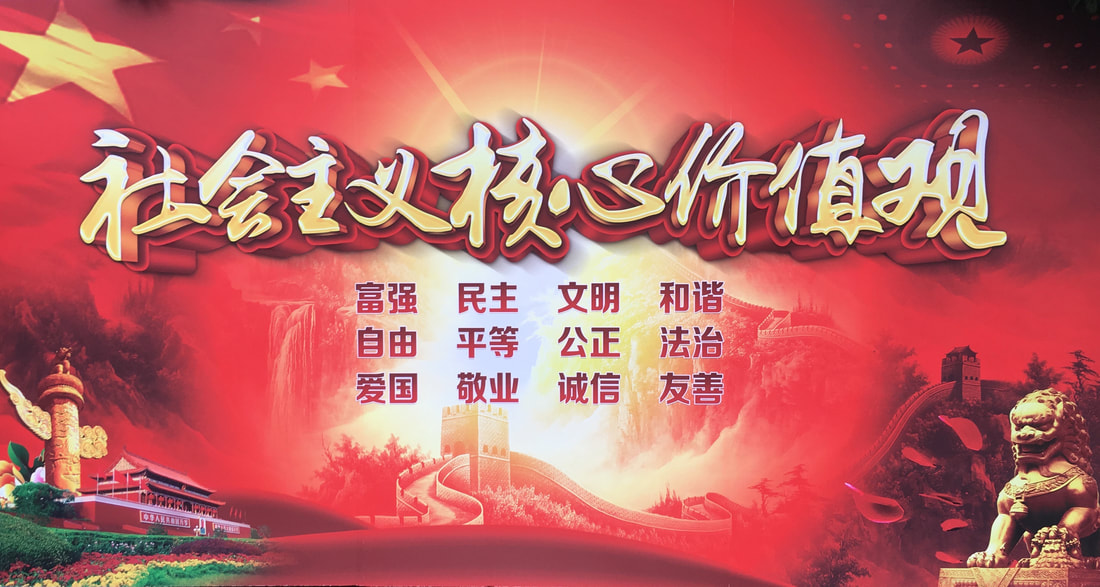
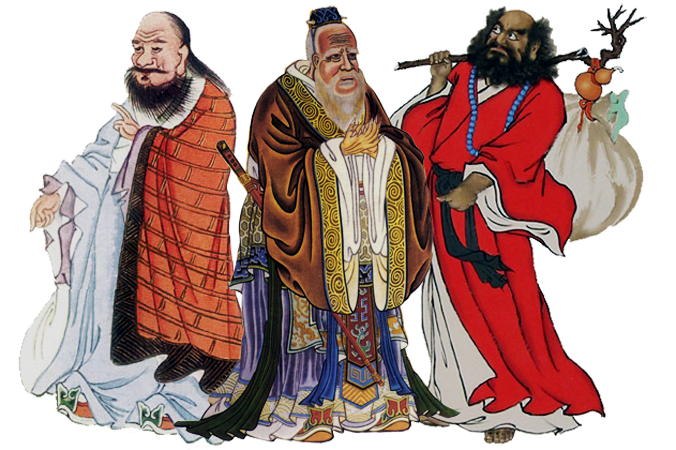
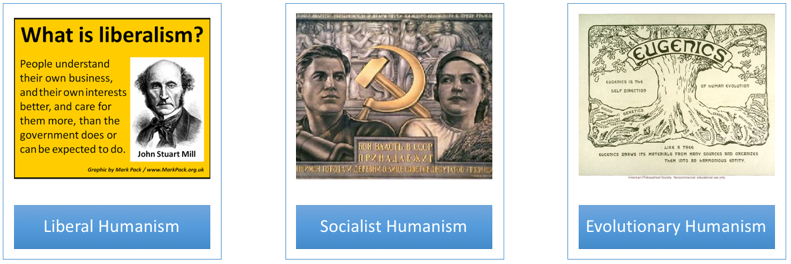
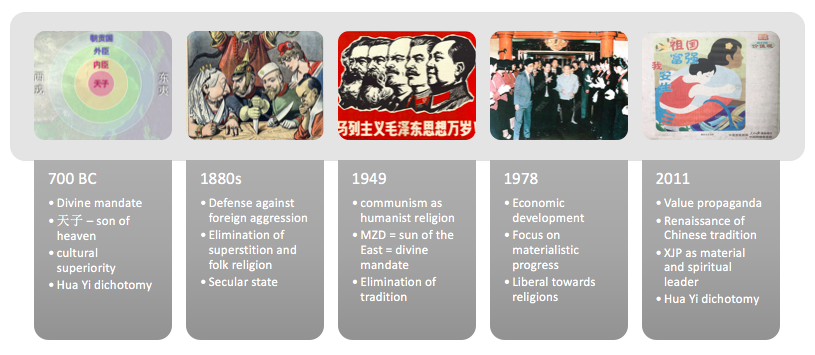
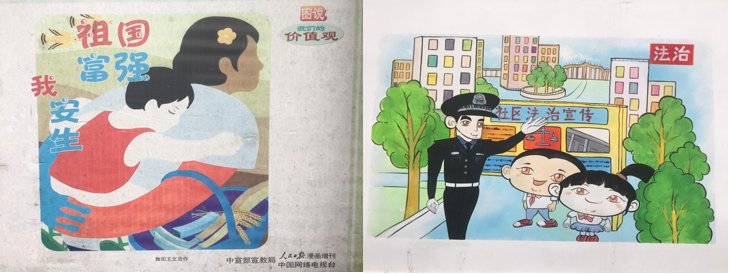
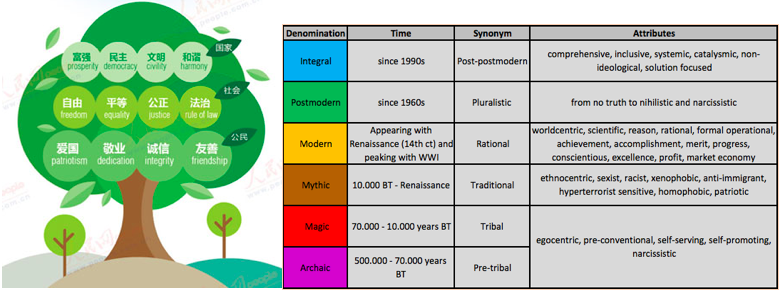
 RSS Feed
RSS Feed